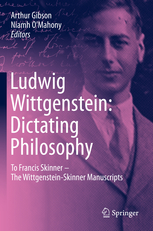Ludwig Wittgenstein: Dictating Philosophy
Ludwig Wittgenstein: Dictating Philosophy
To Francis Skinner – The Wittgenstein-Skinner Manuscripts
Editors: Gibson, Arthur, O’Mahony, Niamh Ann (Eds.)
Is a newly discovered and unpublished collection of Wittgenstein’s continuous manuscripts
Provides new insights into Cambridge philosophy from 1930 to World War II
Presents new original controversial philosophy by a leading philosophical genius

In this volume we witness Wittgenstein in the act of composing and experimenting with his new visions in philosophy. The book includes key explanations of the origin and background of these previously unknown manuscripts. It investigates how Wittgenstein’s philosophical thought-processes are revealed in his dictation to, as well as his editing and revision with Francis Skinner, in the latter’s role of amanuensis. The book displays a considerable wealth and variety of Wittgenstein’s fundamental experiments in philosophy across a wide array of subjects that include the mind, pure and applied mathematics, metaphysics, the identities of ordinary and creative language, as well as intractable problems in logic and life. He also periodically engages with the work of Newton, Fermat, Russell and others. The book shows Wittgenstein strongly battling against the limits of understanding and the bewitchment of institutional and linguistic customs. The reader is drawn in by Wittgenstein as he urges us to join him in his struggles to equip us with skills, so that we can embark on devising new pathways beyond confusion.
This collection of manuscripts was posted off by Wittgenstein to be considered for publication during World War 2, in October 1941. None of it was published and it remained hidden for over two generations. Upon its rediscovery, Professor Gibson was invited to research, prepare and edit the Archive to appear as this book, encouraged by Trinity College Cambridge and The Mathematical Association. Niamh O’Mahony joined him in co-editing and bringing this book to publication.
Buy the book:

